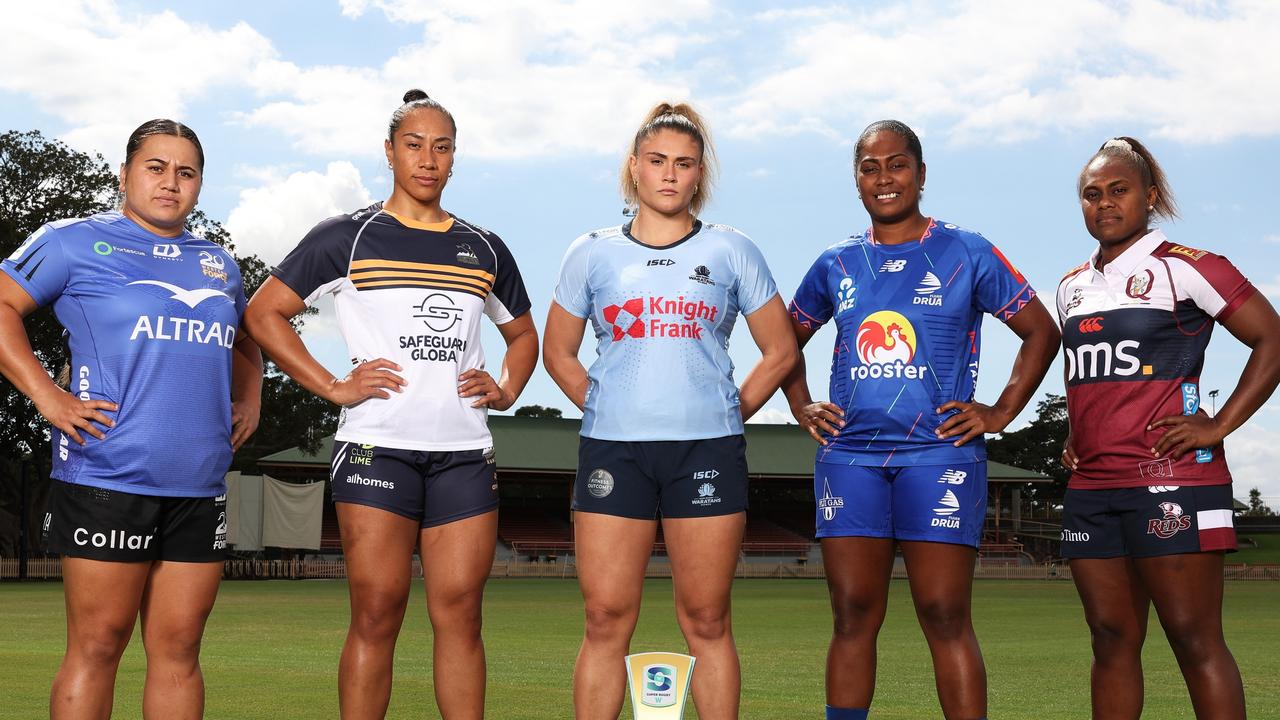The bright idea that put the Stenmark brothers to sleep
Jordan and Zac Stenmark have launched a range of sleep-aid glasses. The twins reveal all about their search for a good night’s rest.
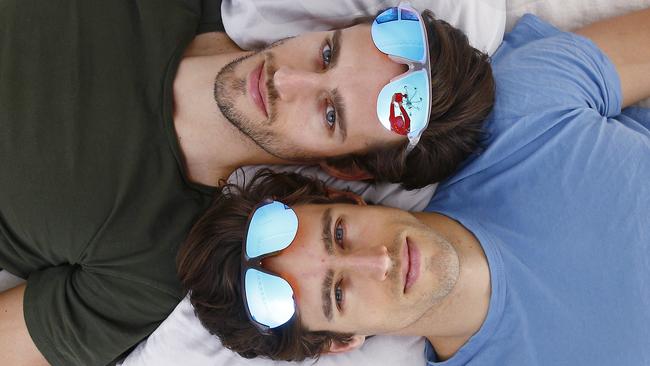
Mosman
Don't miss out on the headlines from Mosman. Followed categories will be added to My News.
Sleep health is big business. There is a myriad of products on the market that claim to help you get a better night’s sleep, from weighted blankets to white noise machines, and the latest is all about blocking blue and green light.
Jordan and Zac Stenmark, who made a name for themselves modelling for the likes of Tom Ford, Giorgio Armani and Tommy Hilfiger, are behind Dreamers eyewear, which claims to block 99.9 per cent of blue and green light emissions from daily screen use and make for a better night’s sleep. Wear them at least 30 minutes before bedtime and the glasses will reportedly regulate the body’s natural production of the sleep hormone melatonin.
The patented DreamTech lens technology was five years in the making. To ensure they got it right, the Stenmarks partnered with co-developers Dr Andrew Huberman, who has a PhD in neuroscience from Stanford University, and Dr Stafford Sheehan, who boasts a PhD in chemistry and physics from Yale University.
The 29-year-old twins became interested in sleep health because of their lifestyle. They were based in New York, travelled home to Australia regularly and had an erratic timetable.
“We were always getting off planes extremely jet-lagged or having really late nights on set and being really wired but then having to get up the next day, ready really early to shoot again,” Zac says.
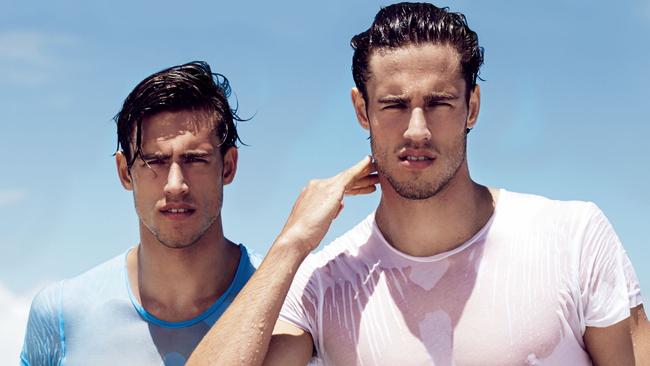
“We had to find a way to help ourselves wind down, fall asleep and recover properly, and at the time we didn’t have anything.”
With a keen interest in science, Zac started reading medical journals and then set about finding the scientists who could help create a product that would help them sleep.
This is where their modelling backgrounds came in handy. They attended lots of events in their careers and at one they saw Dr Huberman speak. They approached him to learn more and it developed into a friendship. Dr Sheehan was introduced to them by friends of friends and another friendship was formed.
“One day we were sitting at this cafe and I was talking to (Dr Sheehan) about this problem of blue and green light and I said to him: ‘Do you think we could come up with something that blocks all this light to allow the body to naturally produce melatonin? And do you think we could create a lens that does this?’ And he said, ‘yeah, I think we could do that,’ and I said, ‘How hard would it be?’ and he got a napkin and said, ‘I reckon it looks something like this’, and that was the initial thoughts, and the mathematics of what is now a 39-page patent,” Zac says.
The impact of blue light has been talked about for the past few years, but green light is relatively unheard of.
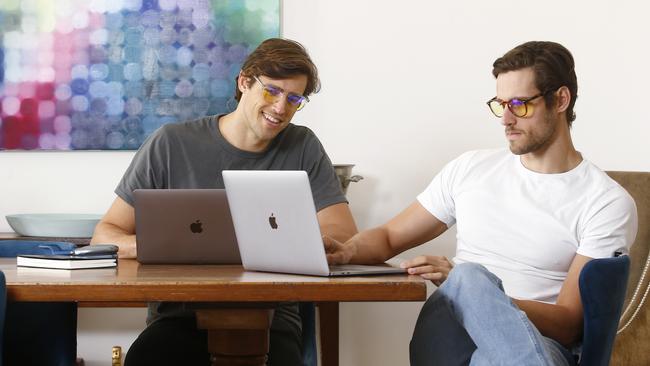
“Green light actually has a massive impact on the body’s circadian rhythm and its ability to produce the sleep hormone melatonin. It suppresses about 45 per cent of melatonin … so it is actually a very big component in massively impacting our sleep and wake cycle,” Jordan says.
“The blue and green light from the artificial light from screens is stopping the body from producing melatonin at night, and stopping your body from falling asleep and getting a great quality of sleep.”
The claims behind blue-light glasses are “controversial”, according to Australian Society of Ophthalmologists board member Associate Professor Alex Hunyor.
“The best review that’s been done in the literature concluded that there’s not good-quality evidence of any proven benefit,” he says.
“I think a lot of the commercialisation with regard to blue light-blocking lenses is around the properties of some of the things observed with regard to the composition of light around twilight, but it doesn’t necessarily mean that blocking blue light is beneficial in terms of your circadian rhythms.
“The original work on blue light being harmful relates to some pretty extreme exposure of lab animals. When talking about screens, that’s still less than the amount of blue light you get on a cloudy day in England.
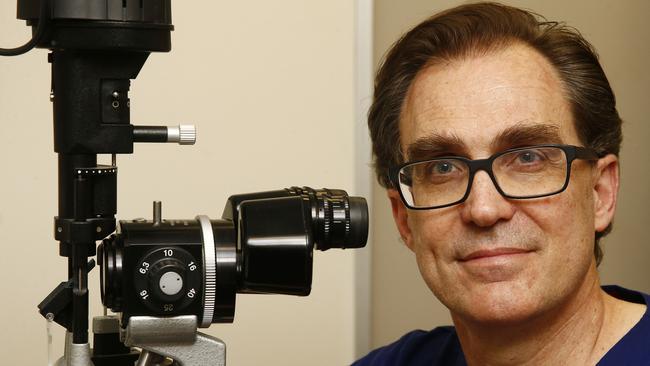
“I think it’s difficult to make a conclusive comment about whether or not it theoretically might help with sleep.
“Certainly, there’s some evidence that spending five hours on a screen before bed can cause sleep disturbances. The best way to prevent that is not to spend five hours on your screen.”
The Stenmarks aren’t worried about the sceptics.
“The one thing about anything that’s new is there’s always going to be critics and that’s why we really worked hard to go out and get a patent and prove the science,” Jordan says.
“I think the critics have also come from the fact that a lot of blue-blocking glasses only block a very small part of the blue light spectrum, so you’re still going to have a lot of melatonin suppressed and it’s going to increase the cortisol and keep you awake.”
Zac welcomes the critics and the chance to prove their product.
“It’s really good to have critics; you want people pushing you to be better, pushing the industry to be better as a whole, be more transparent and really create the best product that really helps people,” he says.
While the doubters are out there, there are also believers, including sporting bodies, militaries and airlines who have approached the Stenmarks about Dreamers.
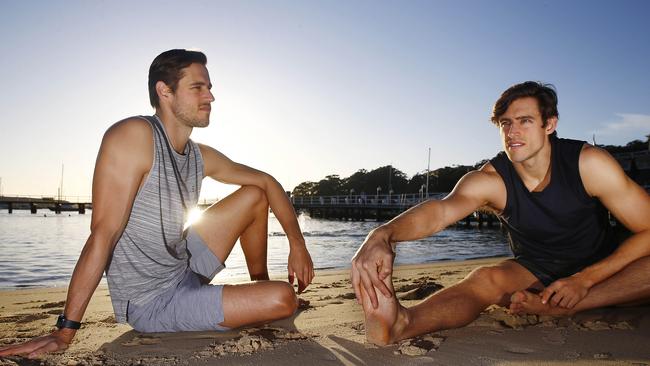
“There’s been interest from airlines’ perspective in helping staff fall asleep and adapt to time zones and also from military and sporting bodies on how to help get high-level performance out of people,” Jordan says.
The Stenmarks may have lived overseas for a decade, but Covid means they are back in the family home in Mosman.
“We were privileged being able to grow up in Mosman,” Jordan says.
“Since coming back, we have rediscovered things like swimming down at Balmoral in the mornings. It’s an amazing thing to be able to do through Covid and we feel pretty blessed to be able to go down in the mornings and relax.
“We’ve been on the road for the last 11 years and so to be able to spend this time on the ground with our family, doing things together – it’s been really nice.”


